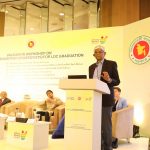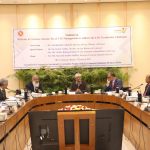Dhaka, 09 December 2024: The Kick-off Meeting on 4th Monitoring Exercise of GPEDC in Bangladesh was held on 09 December 2024 at the NEC Conference Room at the Planning Commission Campus in Dhaka.
Economic Relations Division (ERD), UN Resident Coordinator’s Office (UNRCO), UNDP Bangladesh and Global Partnership for Effective Development Cooperation (GPEDC) with support from SSGP organized the event.
ERD Secretary Mr. Md. Shahriar Kader Siddiky graced the meeting as chief guest. UN Resident Coordinator in Bangladesh Ms. Gwyn Lewis, who was the special guest, joined the meeting through online platform.
Additional Secretary and the Wing Chief of the Development Effectiveness Wing of ERD and the National Coordinator of the GPEDC 4th Monitoring Round in Bangladesh Mr. A. H. M. Jahangir chaired the meeting.
The Global Partnership monitoring is a partner country-led exercise facilitated by GPEDC to promote collective accountability on the effectiveness of development co-operation. Guided by the four internationally agreed principles for effective development co-operation, the monitoring tracks progress of partner countries, development partners and other actors in implementing their agreed commitments to more effective development cooperation.
The first three global monitoring rounds took place in 2014, 2016, and 2018. Bangladesh had actively participated in all these monitoring rounds.
Speaking on the occasion, ERD Secretary Mr. Md. Shahriar Kader Siddiky mentioned that the interim government had been putting a lot of emphasis on effective development cooperation.
He observed that the Development Effectiveness Agenda aligns well with the concept of ‘Three Zero’—zero poverty, zero unemployment, and zero carbon emissions championed by the hon’ble Chief Advisor Dr. Muhammad Yunus—as both shares the common principles of inclusive development, sustainability, and collaboration to drive global progress.
UN Resident Coordinator in Bangladesh Ms. Gwyn Lewis observed that the fourth Global Partnership Monitoring Round presents a vital opportunity to evaluate developing cooperation in Bangladesh and engage a diverse range of stakeholders in the process.
Mr. A. H. M. Jahangir said that the fourth Monitoring Round would provide the country with a unique opportunity to reflect on the progress made, address gaps, and ensure that development cooperation is more responsive to local contexts.
Deputy Secretary of ERD & Alternate National Coordinator the GPEDC 4th Monitoring Round in Bangladesh Mr. A. K. Azad delivered the welcome address of the event.
Policy Analyst at OECD Ms. Ashley Palmer delivered a presentation providing an overview of GPEDC and its 4th Monitoring Round.
The working session of the workshop featured a number of presentations explaining various parts of the questionnaire for the 4th Global Partnership Monitoring Round.
Additional Secretary of ERD and the Wing Chief of the Admin and Middle East Wing of ERD Dr. Md. Rezaul Bashar Siddique and Deputy Secretary of ERD Mr. A.K. Azad delivered a joint presentation on the questionnaire for the Partner Country Government.
Mr. Benjamin Morgan from the UN Resident Coordinator’s Office delivered a presentation on the questionnaire for the DPs. Senior Research Fellow of the Centre for Policy Dialogue (CPD) Mr. Towfiqul Islam Khan delivered a presentation on the questionnaire for the Civil Society Organizations (CSOs) and trade unions. Administrator of the Federation of Bangladesh Chambers of Commerce and Industry (FBCCI) Mr. Md. Hafizur Rahman delivered a presentation on the questionnaire for the private sector.
A total of 59 countries would participate in the 4th monitoring round of GPEDC. For this monitoring round, GPEDC had launched an online reporting tool through which the relevant stakeholders will be able to complete the data collection online. The new monitoring framework has also incorporated elements based on ‘Kampala Principles Assessment’ and ‘Leaving No One Behind’.
Following the final submission of data by partner countries—an Excel sheet with results would be available within three weeks while the Country Results Brief would be available within three months. Subsequently, the mid-term brief would be unveiled by February 2025 while the Global Monitoring Report would be published by the year 2026.





